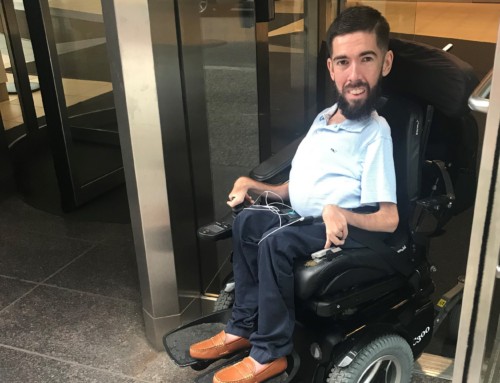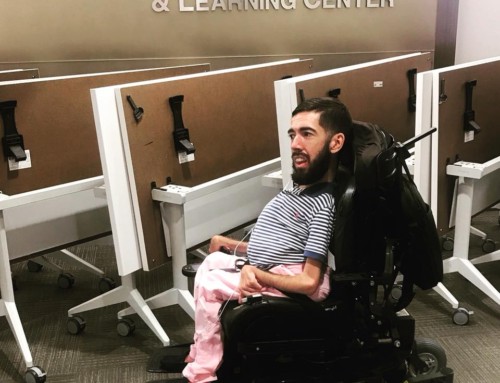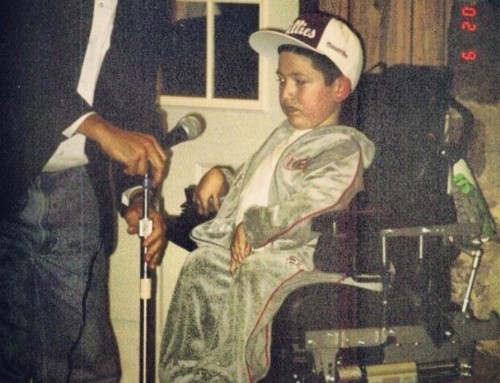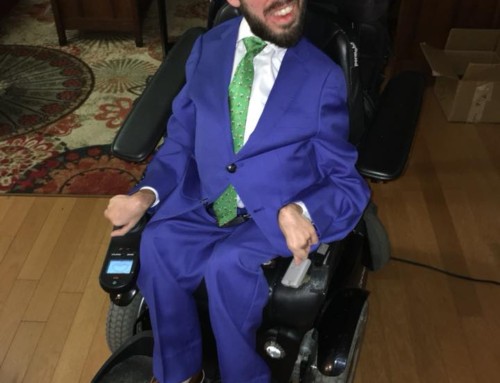Living with a disability is obviously no walk (←pun!) in the park. If you’re an avid disablethebrand.com reader, you’ve already read about some of the challenges we face; from dating with Morgan Duffy to apartment hunting with Jimmy Curran. While I concede that these things are especially difficult for the disabled, they are not inherently challenges faced by ONLY disabled individuals.
There is, however, (at least) one unilateral obstacle that all disabled individuals face, and it comes from a surprising source. The Government. Yes, that’s right, The Man is keeping us down. Or, perhaps more aptly, it is keeping us sucking on the teat that is our welfare system. Currently, US Law is written in a way that guarantees that disabled individuals live destitute lives and strips them of the beating heart of the American Dream; the ability for socio-economic advancement. “But, Conor, what about the ADA and the Fair Housing Act and… and that Presidential thing for getting a federal job?!” you ask. Yes, the ADA, FHA and Executive Order 13548 made leaps and bounds to advance the civil liberties for disabled individuals. But the government itself is still our single greatest oppressor.
As of 2003, there were approximately 2 million disabled adults (under the age of 65) who required assistance with 3 or more activities of daily living (ADLs) to survive (Health Policy Institute, 2003). The average cost for this care is approximately $61,000. To date, no private health care insurance company covers costs incurred when paying for a Home Health Aide (HHA) whose sole purpose is to provide assistance with ADLs. Not one company. Not one cent. Now, you’re probably thinking, “Hm. That’s kind of strange. How can that be?” As a collective, the insurance companies have decided that ADLs are not “medically necessary”, and thus are not compelled to cover that type of care. “What?! Not medically necessary?!” I know. It’s insane. One would think that the term “activities of daily living” would sort of imply their importance to things like, oh I don’t know, living. Daily. But I digress. Private insurance companies have unilaterally decided this and it is what is.
With private insurance unwilling to cover this care, the only other source of funding is public assistance. Namely, Medicaid. To qualify for Medicaid, one must be either over the age of 65 or permanently disabled (make a mental not of this), and pass what is known as a “means” test. The means test has two components:
1. One must not have income in excess of 133% of the Federal Poverty Level (FPL)
2. If single, one may not have countable resource in excess of $2,000. If married, the countable resources of the couple may not exceed $3,000.
To be fair, the first requirement doesn’t really exist anymore. An amendment to the Social Security Act has made it so that any disabled individual who would otherwise be eligible for Medicaid were it not for their income may continue to receive benefits. However, part of “otherwise be eligible” means adhering to part 2 of the means test.
Without much further thought, these rules might make sense. We live in a capitalistic society driven by free market economy. Social Security was put in place to help only the truly needy. It would be unethical for the Bill Gates or Donald Trumps of the world to use Medicaid because they don’t want to foot the bill for care themselves. Unfortunately, the way Medicaid is currently administered makes one grave mistake. Let’s go back for a second to where I told you to make a mental note. In the eyes of the Federal government, there is no difference between someone over the age of 65 and a disabled individual. While it is true that these two groups of people might need similar care, they are vastly different, and treating them the same has major implications.
Let’s look at the situation for the elderly: At 65, one is probably retired with little to no income. They probably own their home (one of the few resources not counted against you in countable resources). If HHA care is needed, and the keyword here is if, it is at least arguable that they go through the spend down process to spend their resources until they become eligible for Medicaid.
And now the situation for me: At 25, I am now 2 years into my professional career. My starting salary far exceeded that allowed by part 1 of the means test. I do not own my home but would like to one day. Unfortunately, I cannot save to buy one because that would violate part 2 of the means test. To be able to live and be an independent I need HHA care. To support myself, I need to work. Working directly jeopardizes my ability to receive HHA care. And let me be clear here, there is no situation where I will not be receiving HHA care. I need it to live as much as you need oxygen to live. So faced with the question of working without the care or going on unemployment and receiving it, I would have no choice but to go on unemployment.
To further add to the insanity, any disabled person receiving Medicaid that is not working is entitled to a monthly Supplemental Security Income (SSI) check in the amount of $721. So, if I am already going to be poor because I can’t save money and you’re going to give me $721/mo, why would I work?
Speaking in hyperboles, I will pay approximately $6,000 in federal income tax this year. If all 2 million disabled people who need help with ADLs paid that same amount, that’s a net revenue of $12 billion in taxes for the government. On the flip side, if all 2 million say “Fuck it, what’s the point,” the government would be committed to paying $17.3 billion in SSI benefits to those disabled people ALL WHILE STILL PAYING FOR THE HHA CARE. So, you tell me, which scenario makes more sense?
Conor McCafferty, a Philadelphia area native, is a University of California: Berkeley graduate who abandoned his west coast adventures to move back east. After a brief stint living and working in Washington, DC for the US Department of Transportation, he currently serves as a Geotechnical Engineer for the US Army Corps of Engineers. In his free time, he enjoys scouring the streets for the best pint of beer in Philadelphia. He also serves as a disability rights advocate, with aspirations of uniting the Philadelphia disabled community under the common goal of advancing Philadelphia’s accessibility to levels on par with other major US cities. If you have questions about this piece, you can contact Conor at mccafferty.conor@gmail.com.
![[dis]ABLE Logo](https://disablethebrand.com/wp-content/uploads/2014/05/jimmy-logo-1-200.jpg)





